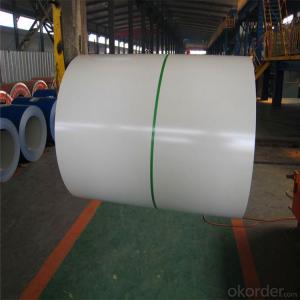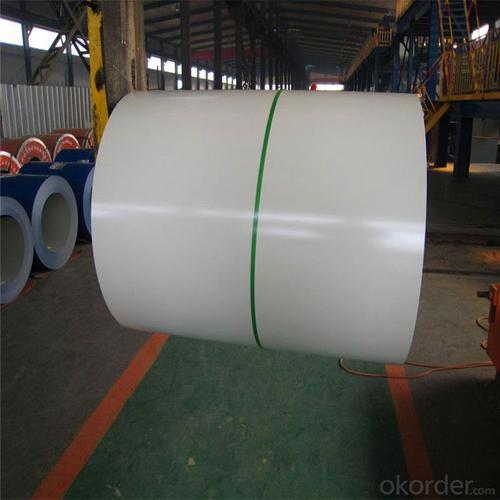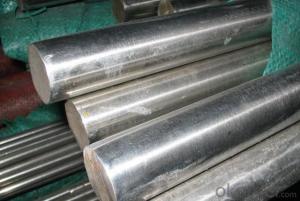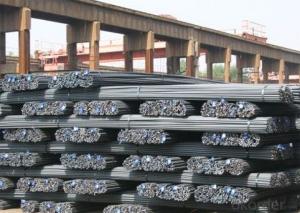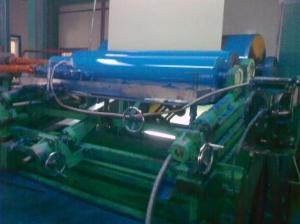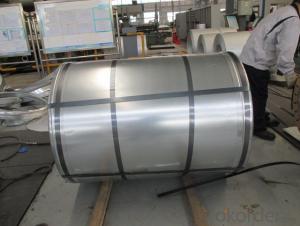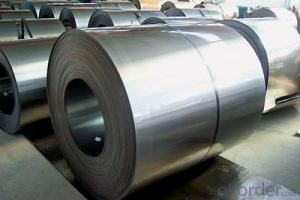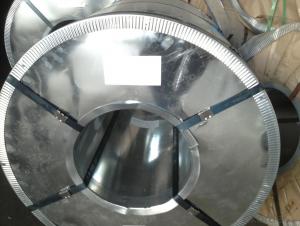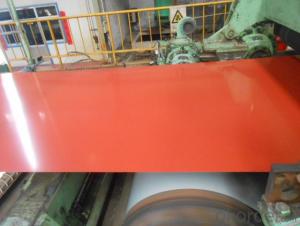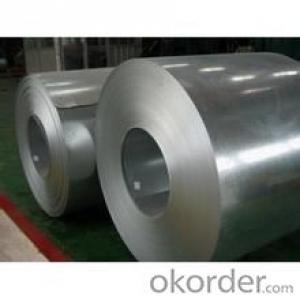Prime 700-1250mm PPGI Cold Rolled Steel Coil
- Loading Port:
- Tianjin
- Payment Terms:
- TT OR LC
- Min Order Qty:
- 100 m.t.
- Supply Capability:
- 500000 m.t./month
OKorder Service Pledge
OKorder Financial Service
You Might Also Like
Specification
Prime 700-1250mm PPGI Cold Rolled Steel Coil
Description of Prime 700-1250mm PPGI Cold Rolled Steel Coil
Product | PPGI/PPGL |
Capacity | 5,000 tons/month |
Base material | Hot dipped galvanized steel |
Thickness | 0.2-2.0mm |
Width | 600-1250mm(according to your need) |
Coil Weight | 3-6tons |
Quality | SGCC, DX51D |
Color | RAL No. or customers samples’ color |
Zinc-coating | 30g/m2-180g/m2 |
Coil ID | 508mm/610mm |
Technique | Cold rolled—hot dipped galvanized—color coated |
Painting | Top painting:15~25μm |
Back painting: 6~10μm | |
Tolerance | Thickness: +/-0.02mm |
Width:+/-2mm | |
Shipment time | within 15-45 workdays |
Payment | T/T, L/C at sight |
Packing | Standard export packing |
The special order can be negotiated. | |
Application of Prime 700-1250mm PPGI Cold Rolled Steel Coil
APPLICATION OF OUR PREPAINTED STEEL | ||||||||||
Construction | Outside | Workshop,agricultural warehouse,residential precast unit | ||||||||
corrugated roof,roller shutter door,rainwater drainage pipe,retailer booth | ||||||||||
Inside | Door,doorcase,light steel roof stucture,folding screen,elevator,stairway,ven gutter,Construction Wall | |||||||||
Electrical applicance | Refrigerator,washer,switch cabnet,instrument cabinet,air conditioning,micro-wave owen,bread maker | |||||||||
Fuiniture | Central heating slice,lampshade,chifforobe,desk,bed,locker,bookself | |||||||||
Carrying trade | Exterior decoration of auto and train,clapboard,container,isolation lairage,isolation board | |||||||||
Qthers | Writing panel,garbagecan,billboard,timekeeper,typewriter,instrument panel,weight sensor,photographic equipment | |||||||||
Products Show of Prime 700-1250mm PPGI Cold Rolled Steel Coil

Product Advantages
1.With nearly 20 years experience in prepainted steel, accommodate different marketdemands. | ||||||||||||||
2.'Quality first, service first' is our business aim; 'The good faith get respect,cast quality market' is our Business philosophy . | ||||||||||||||
3.Having two series producttion line,with the abbual production capacity of 240000 tons. | ||||||||||||||
4.Exceed International ISO9001:2008&ISO14001:2004 quality and environmental standards | ||||||||||||||
5.Meet with ROHS standard |
Company Information
CNBM International Corporation is the most important trading platform of CNBM group.
Whith its advantages, CNBM International are mainly concentrate on Cement, Glass, Iron and Steel, Ceramics industries and devotes herself for supplying high qulity series of refractories as well as technical consultancies and logistics solutions.


F A Q
1, Your advantages?
professional products inquiry, products knowledge train (for agents), smooth goods delivery, excellent customer solution proposale
2, Test & Certificate?
SGS test is available, customer inspection before shipping is welcome, third party inspection is no problem
3, Factory or Trading Company?
CNBM is a trading company but we have so many protocol factories and CNBM works as a trading department of these factories. Also CNBM is the holding company of many factories.
4, Payment Terms?
30% TT as deposit and 70% before delivery.
Irrevocable L/C at sight.
5, Trading Terms?
EXW, FOB, CIF, FFR, CNF
6, After-sale Service?
CNBM provides the services and support you need for every step of our cooperation. We're the business partner you can trust.
For any problem, please kindly contact us at any your convenient time.
We'll reply you in our first priority within 24 hours.
- Q: What are the applications of special steel in the agriculture supply chain?
- Special steel has various applications in the agriculture supply chain, including the manufacturing of agricultural machinery and equipment such as tractors, harvesters, and irrigation systems. It is also used in the production of storage containers, silos, and fencing materials for farms. Additionally, special steel is utilized for constructing infrastructure like bridges, railings, and support structures in agricultural facilities. Overall, the use of special steel in the agriculture supply chain ensures durability, strength, and longevity of essential equipment and structures, enhancing efficiency and productivity in the farming industry.
- Q: What are the different types of case-hardening steel?
- There are several different types of case-hardening steel, including carburizing steel, nitriding steel, and cyaniding steel.
- Q: How does special steel contribute to the wear resistance of products?
- Special steel contributes to the wear resistance of products by offering superior hardness, strength, and durability compared to regular steel. Its unique composition, which may include additional alloying elements like chromium, nickel, or molybdenum, enhances its ability to withstand friction, abrasion, and other forms of wear. This enables products made from special steel to have a longer lifespan and perform effectively in demanding applications, reducing the need for frequent replacements and maintenance.
- Q: What are the different types of high-speed steel?
- There are several different types of high-speed steel, including M1, M2, M42, and T1. These variations have different compositions and properties, such as varying levels of tungsten, molybdenum, and vanadium, which affect their hardness, toughness, and heat resistance.
- Q: How does special steel contribute to reducing weight in applications?
- There are several ways in which special steel can help to reduce weight in applications. Firstly, special steel alloys can be designed to have high strength-to-weight ratios. This means that they can provide the same level of strength and performance as other materials, such as traditional steel or aluminum, but with less weight. By substituting special steel for heavier materials, manufacturers can decrease the overall weight of the application without compromising its structural integrity. Furthermore, special steel can be manufactured with enhanced fatigue resistance and durability properties. This allows for the use of thinner and lighter sections without sacrificing strength. This is particularly crucial in industries where weight reduction is crucial, such as automotive and aerospace, as it enables the production of lighter vehicles or aircraft. As a result, fuel efficiency is improved and emissions are reduced. Moreover, special steel can also contribute to weight reduction through its versatility in manufacturing processes. It can be easily formed, shaped, and welded, allowing for the creation of complex and lightweight structures. This flexibility in fabrication methods empowers engineers to optimize the design and maximize weight savings by utilizing special steel in innovative ways. In conclusion, special steel aids in reducing weight in applications by offering high strength-to-weight ratios, improved fatigue resistance, and durability. Additionally, it provides versatility in manufacturing processes. These attributes make special steel an ideal choice for industries seeking weight reduction, ultimately resulting in enhanced performance, efficiency, and sustainability.
- Q: What are the different high-temperature grades of special steel?
- There exists a variety of special steel grades that can withstand extreme heat and provide enhanced mechanical properties. Some of the frequently utilized high-temperature grades are as follows: 1. Stainless steel 310: Renowned for its exceptional resistance to oxidation at high temperatures, this grade boasts a high chromium and nickel content, resulting in excellent corrosion resistance and elevated temperature strength. 2. Inconel 625: Inconel alloys, which are nickel-based superalloys, exhibit remarkable resistance to oxidation and corrosion. In particular, Inconel 625 offers outstanding strength and toughness at high temperatures, rendering it suitable for applications in aerospace and chemical processing industries. 3. Hastelloy X: A notable example is Hastelloy X, a nickel-chromium-iron-molybdenum alloy that showcases extraordinary strength and oxidation resistance at elevated temperatures. It finds widespread use in gas turbine engines, industrial furnace components, and other high-temperature applications. 4. Alloy 800H: This specific grade of special steel is an austenitic alloy that possesses high resistance to oxidation, carburization, and nitridation. It frequently finds application in heat exchangers, furnace components, and petrochemical industries. 5. Titanium Grade 5: While technically not steel, titanium grade 5 is a high-temperature alloy that delivers exceptional strength and corrosion resistance at elevated temperatures. It is commonly employed in aircraft engine components, chemical processing equipment, and marine applications. These examples merely represent a fraction of the high-temperature grades of special steel available in the market. Each grade serves a specific purpose, excelling in various applications that demand extreme heat resistance and specific mechanical properties.
- Q: What are the main characteristics of spring steel?
- Spring steel is a type of high-carbon steel known for its exceptional elasticity and resilience. Its main characteristics include high tensile strength, excellent fatigue resistance, and the ability to withstand repeated bending or twisting without permanent deformation. Spring steel also exhibits good corrosion resistance, making it suitable for various applications where durability and flexibility are required, such as springs, clips, and automotive components.
- Q: What are the different methods for annealing special steel?
- There are several methods for annealing special steel, including full annealing, process annealing, stress relief annealing, and spheroidizing annealing. Full annealing involves heating the steel to a temperature above the critical range and then slowly cooling it to room temperature. Process annealing is used to improve machinability and involves heating the steel to a temperature below the critical range and then cooling it in still air. Stress relief annealing is carried out to reduce internal stresses in the steel by heating it to a temperature below the critical range and then cooling it slowly. Spheroidizing annealing is used to improve the steel's formability and involves heating it to a temperature below the critical range and then cooling it slowly. Each method has its own specific purpose and benefits for annealing special steel.
- Q: How does special steel contribute to reducing energy consumption?
- Special steel contributes to reducing energy consumption in several ways. Firstly, special steel is known for its high strength and durability, allowing it to be used in the construction of lightweight structures. This helps in reducing the overall weight of vehicles, machinery, and buildings, resulting in lower energy requirements for their operation and transportation. Additionally, special steel is used in the manufacturing of energy-efficient appliances and equipment, such as turbines and generators, which optimize energy conversion and minimize energy losses. Furthermore, special steel is often used in the production of renewable energy systems like wind turbines and solar panels, enabling the efficient generation of clean energy. Overall, the unique properties of special steel help in achieving energy efficiency goals and promoting sustainable practices.
- Q: How does special steel contribute to the power generation sector?
- The power generation sector greatly relies on special steel due to the numerous benefits it offers and its contribution to the overall efficiency and reliability of power generation equipment. Special steel plays a vital role in this sector by providing superior strength and durability, which is essential given the demanding and extreme conditions involved in power generation, such as high temperatures, pressure, and corrosive environments. By being specifically designed to withstand these harsh conditions and maintain its structural integrity, special steel ensures the long-term reliability and safety of power generation equipment. Various components of power generation equipment, including turbines, boilers, and generators, benefit from the use of special steel. For instance, gas turbines utilize special steel for the construction of turbine blades and vanes, which endure immense heat and rotational forces. Special steel's high-temperature resistance and strength enable these components to operate efficiently at elevated temperatures without deformations or failures, thus enhancing the performance of gas turbines. Furthermore, special steel exhibits excellent corrosion resistance, making it suitable for power plants that employ water-based cooling systems. These cooling systems often use seawater or chemically treated water, which can be highly corrosive. By incorporating special steel in critical components like condensers and heat exchangers, the power generation sector significantly reduces maintenance and replacement costs associated with corrosion-related issues. Moreover, special steel plays a crucial role in the construction of nuclear power plants. It is utilized in the fabrication of reactor pressure vessels, steam generators, and fuel assemblies. The radiation resistance and high strength of special steel ensure the safety and reliability of these components in nuclear power plants, thereby contributing to the overall efficiency and sustainability of the power generation sector. In conclusion, special steel's exceptional strength, high-temperature resistance, corrosion resistance, and radiation resistance make it an indispensable material in the power generation sector. Its usage enhances the efficiency, reliability, and safety of power generation equipment, ultimately contributing to the growth and sustainability of the power generation industry as a whole.
Send your message to us
Prime 700-1250mm PPGI Cold Rolled Steel Coil
- Loading Port:
- Tianjin
- Payment Terms:
- TT OR LC
- Min Order Qty:
- 100 m.t.
- Supply Capability:
- 500000 m.t./month
OKorder Service Pledge
OKorder Financial Service
Similar products
Hot products
Hot Searches
Related keywords
